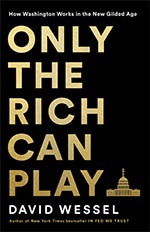Book review: Only the Rich Can Play

Roula Khalaf, Editor of the FT, selects her favourite stories in this weekly newsletter.
Take the energy and loose change of a Silicon Valley billionaire, create an unconventional think-tank in Washington, recruit high-level bipartisan politicians as supporters, simmer gently until an opportunistic moment arises and stand back as multiple cooks interfere to alter the taste of the final dish.
That, as David Wessel describes in Only the Rich Can Play, is not a normal recipe for impatient tech entrepreneurs, nor one that has garnered much success for lobbyists pushing for ambitious tax reforms in the dysfunctional Beltway atmosphere of recent years.
But it was Sean Parker’s approach. In 2013, the co-founder of the Napster music-sharing service floated an idea at a $1m “future of philanthropy nightcap” party in Davos. Within four years, the “opportunity zones” (OZs) he proposed had crystallised into a tax break garnering millions of dollars in investment later championed by Donald Trump and the White House.
The aim, as announced by the US Treasury, was to encourage economic growth and investment in distressed communities, by offering tax breaks for investors who locked away capital gains for a decade. It became, Wessels writes, “the centrepiece — pretty much the only piece” of Trump’s strategy aimed at helping poor and black communities.
But, the book shows, the reality was a jamboree for accountants, lawyers, developers and investors wanting to maximise their income and minimise their taxes. The communities in need of support were left on the sidelines and were set back further as costly developments were imposed on their neighbourhoods, largely benefiting outside investors.

Parker bankrolled the Economic Innovation Group, which distinguished itself from classic think-tanks by initially operating by stealth as it built bipartisan support through funding elected officials, hiring a senior congressional staffer and avoiding pushing a particular special interest. It later launched publicly with a series of datasets around poverty and entrepreneurship that generated media and political attention across the country to bolster the case for intervention.
Wessel, a senior fellow at the Brookings Institution think-tank, brings his analytical lens to the story. Reporting of policy often focuses disproportionately on the initial political battles and rhetoric — to which he devotes sometimes too much detail. But, to his credit, he goes much further to explore what happened next, drawing on the best available research on the effects once the battle moved from legislation to implementation.
He demonstrates his gumshoe credentials as a former journalist, going on the road to observe how OZs were hyped at trade fairs in Las Vegas and talking to officials and developers from Oregon to Maryland where the policy was applied. He demonstrates a strong turn of phrase, an eye for detail and a generosity of heart by attributing to his extensive list of interviewees some of his best lines.
In short, OZs were “a stowaway on Trump’s biggest tax cut bill”, which turned 8,764 census districts into “domestic tax havens” or “domestic emerging markets funds”. The compromises to get them adopted meant there was no accountability or reporting to justify their nominal social objective.
Wessel seeks to be scrupulously fair, navigating between “Trump-phobic headlines and overblown boosterism” in evaluating the policy. He acknowledges that — at least until the Internal Revenue Service releases comprehensive data — even basic statistics on money invested and tax deferred are scant. But the preliminary pattern is gloomy.
On one hand, the sums put in were far less than the initial hype. On the other, the $75bn he estimates was channelled into OZs up to the end of 2019 largely went to places that were already on the up, primarily benefited rich investors outside the targeted communities and supported projects that did little to boost local economies — from self-storage facilities to data centres offering scant employment.
He finds a few efforts by local officials, foundations and impact entrepreneurs to use the tax breaks to support local businesses or provide affordable housing. But demand has been limited and often the OZ was “icing on the cake” of projects that were already receiving subsidies.
Wessel cites the historical parallel of the UK’s enterprise zones, launched in the 1980s to tackle inner city deprivation. Most evaluations suggested job creation was costly and minimal, the benefits accrued to property owners more than local residents, and success required employment and skills support alongside tax incentives.
The author concludes Parker was not venal — he did not invest any of his capital gains in OZs and considered his backing to be philanthropic — but he was “idealistic, arrogant, stubborn and naïve”.
In a sobering reflection on how policy can go wrong, its backers spent too much time creating a policy to encourage the rich to invest and far too little learning the lessons of the past or listening to those in the communities their policies were supposed to benefit. A moral tale for wealthy do-gooders everywhere.
Only the Rich Can Play: How Washington Works in the New Gilded Age, by David Wessel, PublicAffairs, £25/$30
This article is part of FT Wealth, a section providing in-depth coverage of philanthropy, entrepreneurs, family offices, as well as alternative and impact investment
Comments